A Life Measured: The Parasitic Nature Of Capitalist Dystopia
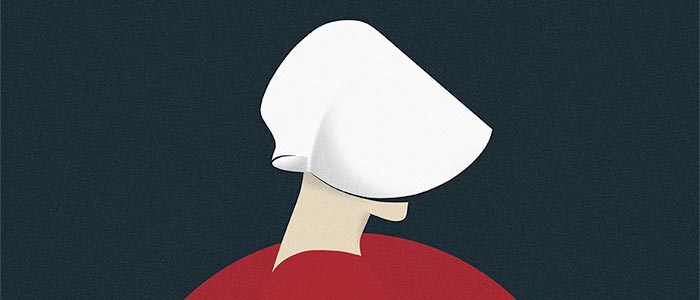
Science Fiction and Social Reality
Science Fiction and dystopia in particular have its narrative roots for most part in current affairs, science and technology, and the discussion and debate of its more troubling nature. The roots act as a social dialogue of sorts within science fiction films and writings. It has been thirty years since Margaret Atwood penned the world of Gilead and its leading ladies under the oppressive regime of a fictitious dystopian future. I wanted to use this dystopia as a starting point, not only to highlight its current relevance and importance, but also to explore our current social dialogue that still permeates the medium even now.
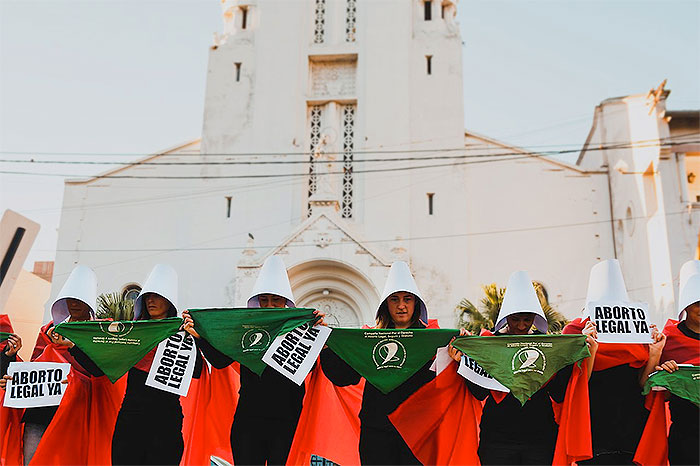
Although the article begins with Atwood’s dystopia it highlights a pattern of Capitalist extraction of surplus value 1as theorised by Marx. Initially exploring themes in The Handmaid’s Tale, the article moves onto extraction and surplus value, first in the form of reproduction, before applying an extraction theory lens to other science fiction dystopias. The Matrix, Never Let Me Go, Blade Runner 2049 and Johnathan Glazer’s Under The Skin are explored and evidenced to suggest how their roots are not a speculation of the future but a product rooted in the world in which we live. In Donna Harroway’s Cyborg Manifesto 2 she states “The boundary between science fiction and social reality is an optical illusion” This article aims to explore just a fraction of that boundary.
It’s quite significant that The Handmaid’s Tale is sometimes categorised as dystopian science- fiction. The truth be told it feels too far removed to be considered a possibility or a representation of truth. Speculative fiction is usually driven by the cultural dialogue of the time and this speaks volumes after thirty years on our shelves and divulges just how far society has come in the pursuit of women’s rights.
“Her fault, her fault, her fault.”
Margaret Atwood
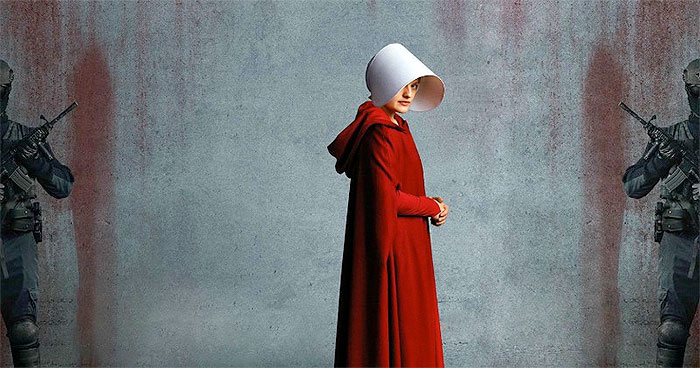
Both the Novel and the Amazon Prime series do well to tell the tale of the current climate and victim blaming culture. When Ofwarren divulges that she had been gang raped at fourteen. Aunt Lydia asks: “Who’s fault is it?” And the handmaid’s chant “Her fault, her fault, her fault. Teach her a lesson, teach her a lesson!” Exploring present-day society of victim blaming culture and the rate of women who do not come forward after being assaulted, it stands at a staggering 75%. 3 The internationally famous rape case of Brock Turner, 4 who served just months of a jail sentence has perpetuated a culture in which the rapist becomes the victim, much like of the relationship between Mr Waterford and Ofglen.
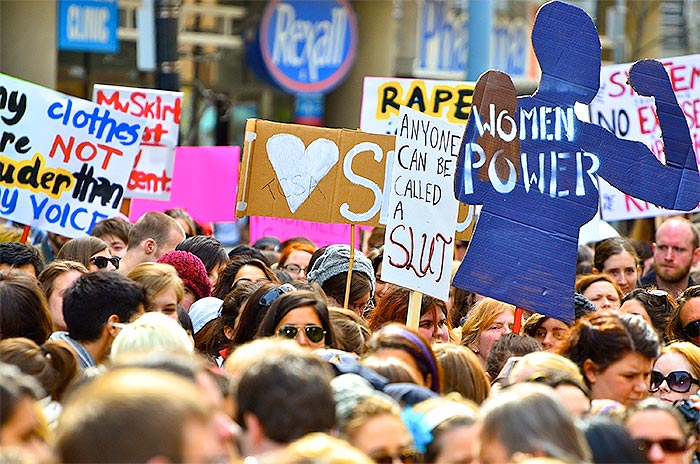
“A third of people who were surveyed believed that women who flirt are partially responsible for being raped. “
Crime Survey for England and Wales
In the year 2016 to the end of March 2017, the Crime Survey for England and Wales 5(CSEW) estimated that only 15% of rape cases are taken forward and that conviction rates for rape are far lower than other crimes with only 5.7% of reported cases ending in conviction for the perpetrator. Finally, a third of people who were surveyed believed that women who flirt are partially responsible for being raped. So even after thirty years both the book and the series reveal a culture in which female victims are held responsible for male crimes as they are anointed wardens of the wandering libido.
The Ardent Anti-Feminist
With the exception of Nick, the men in Gilead are vile subjects of toxic masculinity. However, the more worrying aspects of the show are the women who consume the patriarchy and stand in silence as women are subjected to misogyny, coercion and control. Serena Joy, the wife of Mr Waterford is a loyal supporter of the oppressive regime and an activist for anti-feminism. She was prototyped on Phyllis Schlafly 6, a Californian conservative that repealed the equal rights amendment. What’s concerning is that the Serena Joy of today could also be prototyped on some high-profile women such as Melania Trump 7or worse Pauline Hanson 8 an ardent anti-feminist who proposed cuts to parental leave because in her words “Women would get themselves pregnant.” More recently was the repealing of women’s rights signed off by Kay Ivey 9who passed a bill in Alabama to quash abortion at any stage, under any circumstance.
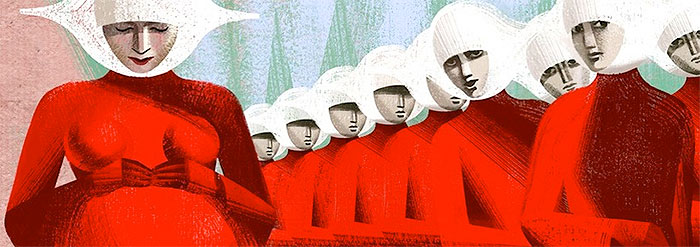
Women have been out in force marching in full Handmaid attire with signs that read “Make Margaret Atwood Fiction Again” 10 The message is clear that those who take part in in women’s marches quite often have the freedom and individual liberty to do so, but for some women especially those who fall outside of European laws (with the exception of Poland, Malta and Cyprus) and even more so women of colour or working lower classes.
In England we don’t agitate for basic human freedoms. However, this is overshadowed by the fact that some women have first-hand experience with Offred’s life. The women in India’s surrogacy hostels 11 who’s plight has them renting their wombs for the chance to clamber out of poverty, or mothers of the stolen generation who can relate to Offred’s child being snatched away as they too try to reclaim missing members of their family. It’s still poignant and relatable now. 12 Although it may seem far removed from the UK and our British philosophy, austerity measures 13 have had women on the bread line unable to feed and clothe their children, making a case for social services to re-home them elsewhere in foster-care or with new adoptive parents.
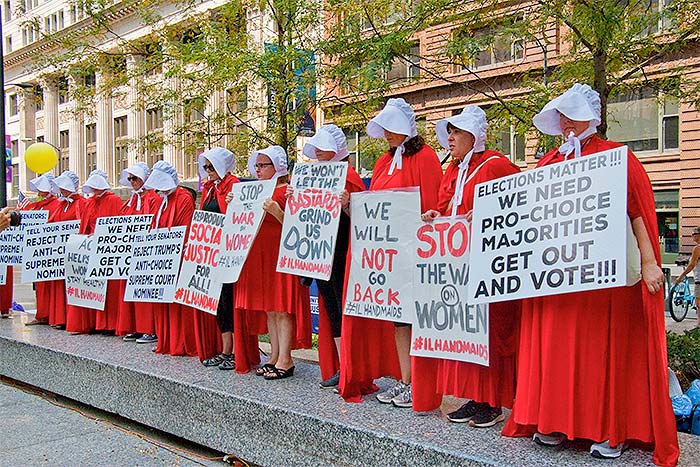
In The Handmaid’s Tale a woman’s worth was dependent on her ability to produce life as a group of white men decided the fate of the women’s body. It’s a reflection of the bill that was passed on a vote of 25 white men 14 in the state of Alabama and passed by the anti-feminist Kay Ivey. Atwood herself compared these laws to a form of slavery. Ofwarren (Janine) who’s character had previously had an abortion is bullied by the Handmaids for doing so and is forced later to give birth. Further on in the narrative she attempts to take her own life. Atwood’s, social dialogue came from the communities she had researched far and wide, it was about expressing a truth within fiction. She exclaimed at a Q&A in New York:
“Who’s going to pay for the orphans of the dead women? Because that’s what you’re going to have. And I’m waiting for the first lawsuit. I’m waiting, you know, in which the family of the dead woman sues.”
Margaret Atwood
Taking away choice is something that will affect all women but ultimately the lower waged population 15 who cannot afford to take a flight to a different state where choice is possible or have the financial cushion to support a child. This leaves those in poverty further impoverished and at a disadvantage, but it will also mean the working-class female will return to work in lower waged jobs to support her family, keeping the capitalist cog turning and the Neo-liberal ideals just an Ideology:
“There is nothing new and nothing liberal about Neoliberalism.”
Noam Chomsky
Neo-liberalism has elaborated a narrative of female empowerment and instead of finding a new and liberal path it harnesses the dream of women’s emancipation to the machine that is Capitalism and offers women to “Lean in” and work harder for less pay than their male counterparts:
“Women’s Liberation has become endangered and entangled in Neo-liberal efforts to build a free market.”
Nancy Fraser
Feminists once criticised a society that promoted careerism and became a movement with an ideology of social solidarity among women. It now promotes a very different view of female CEO’s, Careerism and individual advancement. The motto “We can do it” Is now replaced with I can do it as it shifts away from the state welfare provision.
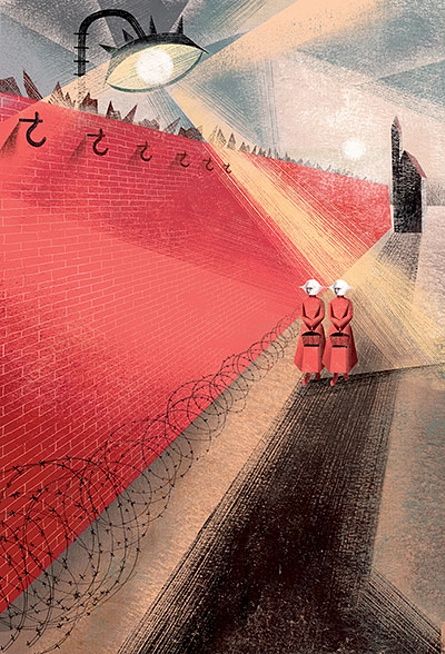
“The second wave of feminism was a critique of the first, but it has now become the Handmaiden of the second.” Nancy Fraser 16 As women are pitted against one another in a hierarchical environment that can be seen in the narrative of the Handmaid’s Tale.
The feminist emphasis has also been predominantly focused on gender identity and class struggle instead of challenging racial inequality, domestic violence, sexual assault and reproductive oppression for all of which the laws and legislation have remained stagnant. This is emphasised in Atwood’s work and as women’s rights are further repealed it’s not hard to imagine a world where Gilead exists and with places like Iran among many others 17 , it seems imminent. If you control the women, you control the population and for the first time restrictions on men’s bodies 18 have been impacted too reducing women to baby making machines, extracting a new generation of menial workers and front line cannon fodder.
The feminist contribution 19 to paternalism has also converged with neo-liberalist ideals of nongovernment organisation. Microcredit, (Small loans for impoverished people to begin a business) is touted as entrepreneurship to alleviate poverty. In hindsight, the loans have boomed and the support and infrastructure from the government to fight poverty has diminished or receded and left small businesses with high interest rates. 20 Neo-liberalism and capitalism are no longer viable agendas as corporations and privatised business depoliticise social problems they create:
“We live in a world where bankers are the heroes and debt is our salvation.“
Jason Hickel
Again, feeding the bloodsuckers from the bottom up through a matter of extraction (Marx).
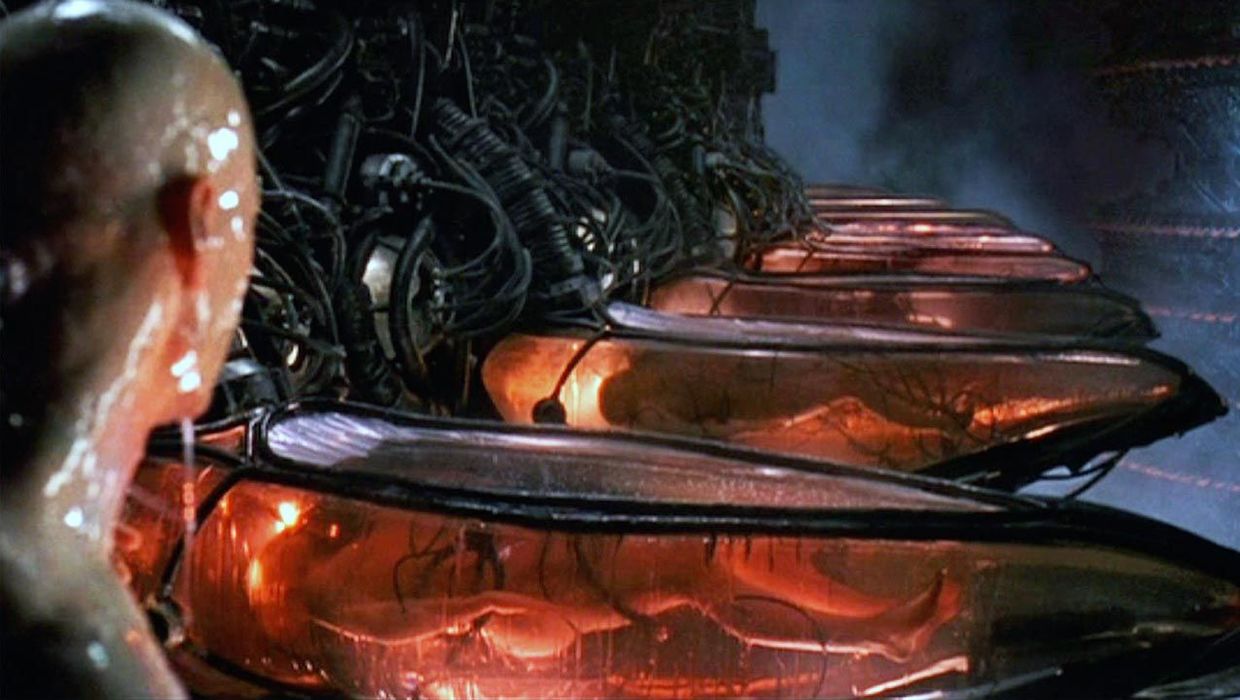
Science Fiction: The Extraction Process
Applying this same extraction lens to other dystopian science fiction films and highlighting the relationship with capitalism and the economy, This form of extraction is evident in many ways. 21 The Matrix sets up the dystopian effect of late capitalism, which depicts what capital does in order to replenish society. As we go about our business attached to our phones and devices blurring the lines between work and play until there are no boundaries, and both become one. 22 It’s representative of our daily lives, the consumer zombie in us and the bodies that feed the machine as a method of extraction; data mining, access to our personal time, through work group chats, or email that extend our office hours and the insidious advertising that no longer waits for us to switch on the TV set. It’s in our pockets, it’s with us everywhere we go, it knows what we want and when we want it due to our consumer habits and its crafty algorithms. Apple may make I-Phone’s but their overt use of data collection is a valuable surplus, it extracts value directly from us as individuals and we willing accept our terms and conditions and let it.
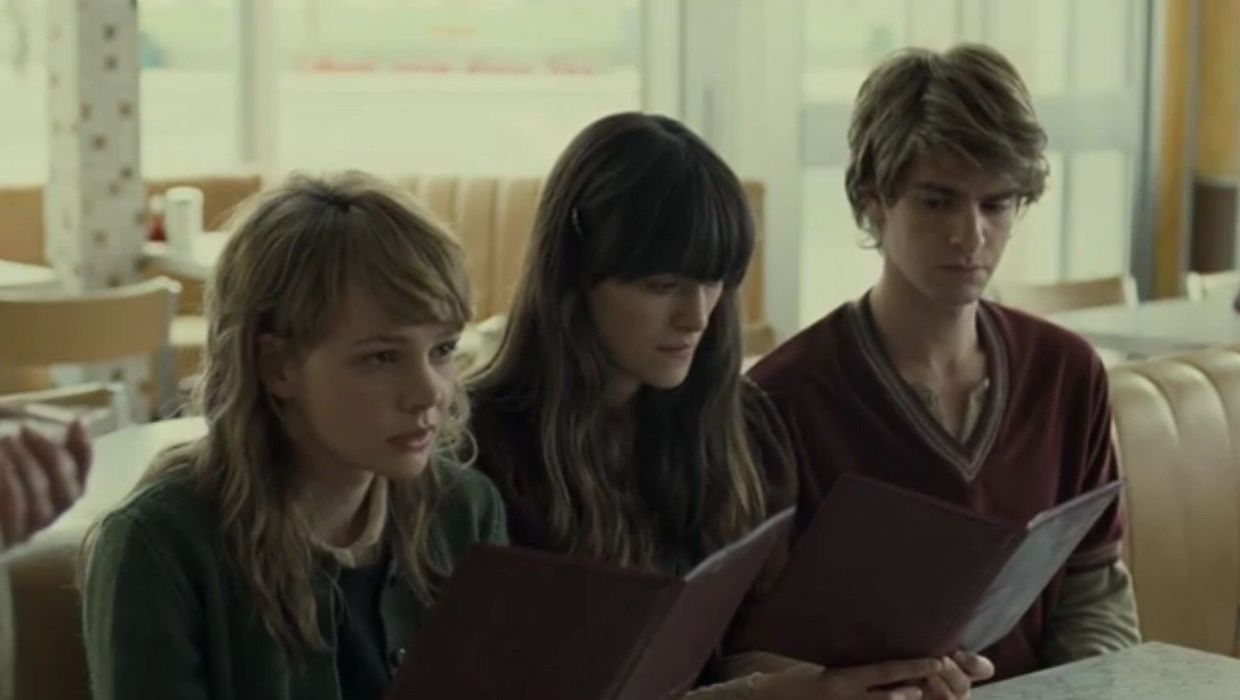
The Dystopian Never Let Me Go depicts a cohort of clones not like the kind for combat, as depicted in space operas such as star wars but clones for the rich, whose whole existence is based on replenishment. What is important is that the story is not too far removed from the extraction of capitalism today: Human organ 23 and egg sales 24 have a global thriving market selling to the wealthier population, representative of a system in which unknown, undervalued, under represented navvies feed the bulk or the “Matrix” in which we live, both legally and illegally across the world.
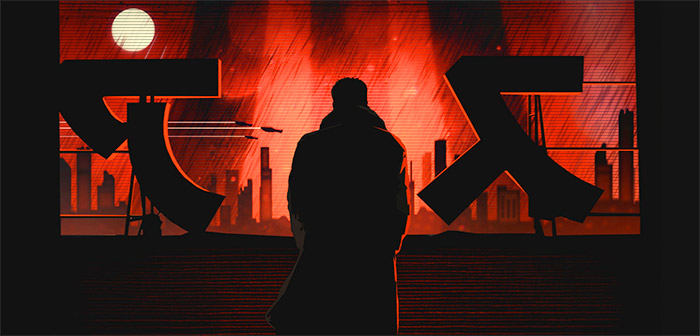
In Blade Runner 2049 the elevated hierarchy exploit it’s replicant’s and enslave them as an “Other” non-human, which reflects the oppression of subordinate groups within our own society and the hegemonic fashion we fall under. Making the young factory workers little cogs in the bigger machine with no alternative, which sounds familiar because it is. Children of the Agbogbloshie 25 site in Africa source and strip equipment from the biggest E-Waste site in the world, as technology advances faster than you can say “upgrade me.”
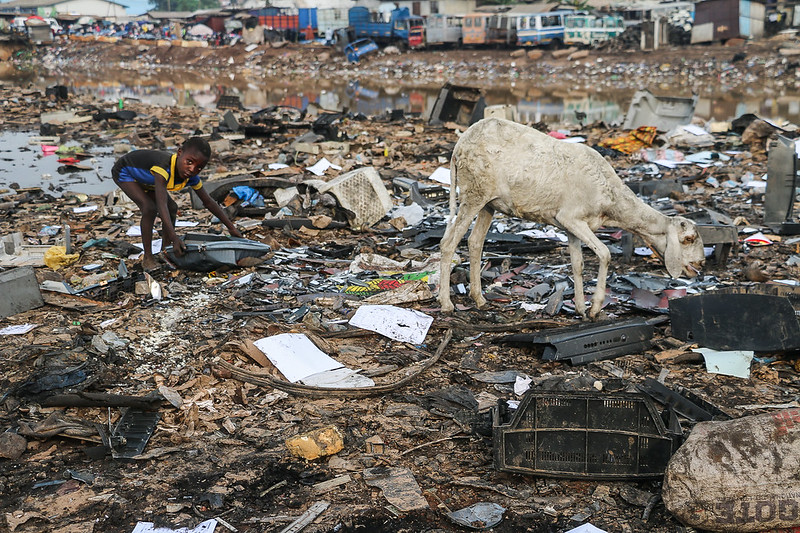
Johnathan Glazer’s Under The Skin could be seen as a dystopian view of these future technologies beyond the now that act callously, with a metaphorical thirst for human flesh. As Johansson devours her victims one by one she leaves helpless people to die and children to perish. It could also be representative of our apathy to let the world go to hell or stand by and even watch or be complicit in human suffering. It’s only when Scarlett Johansson is under the skin of another human being, she begins to feel empathy for her wrongdoing signifying a former detachment from humanity as an AI. As we might feel detachment behind our screens at a distance from human contact.
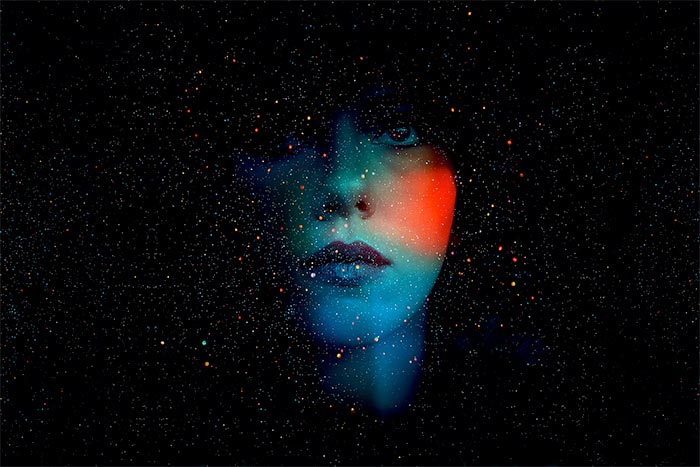
The film is ambiguous but significantly focused on the vulnerable and the victims she lures to their demise. Johansson is not your usual sex symbol promoting a science fiction epic, but more of a brooding force to be reckoned with. Her feminine appearance is the guise of a juicy worm. Until the sharp sting of a hook reveals the baited entrapment. Just as the female commodity has been punted for decades under the capitalist regime. However, It’s a little different. In this film as a prevalent sex symbol Johansson is exposed in her first nude scene but is patently asexual and in the final moments her skin falls away and all that’s left as an empty wrapper. This leans into a pivotal question at the end of the film that lingers. When will our own cultural beliefs and the notion of gender identity be able to do the same? Furthermore, her genderless form also represents the absence of the feminine as it carries out orders without question to “feed the machine” or higher power as also depicted in The Matrix.
“It is easier to imagine the end of the world than to imagine the end of capitalism.“
Fredric Jameson
In the current climate these comments could be more aligned with climate-change denialism and the sentiment that “it is easier to desire the end of the world than to desire the end of capitalism”. 26 However, the credit crisis and collective movements such as extinction rebellion and the #MeToo 27 movement has given way to a new wave of thought. Dystopian Science Fiction film paints a gloomy view of the future because our current states of affairs dictates our fictional narrative. All Dystopian futures have been influenced by the present, from Orwell’s Animal Farm and the rise of fascism, to Atwood’s tale of rebellion and repression. Dystopia and Capitalism go hand in hand but as the cracks begin to show, change is pathing the way to post-capitalism ideals in the form of , diverse economies and collective movements. So the question is, will the Science Fiction Film genre look to a more Utopian view of the world?
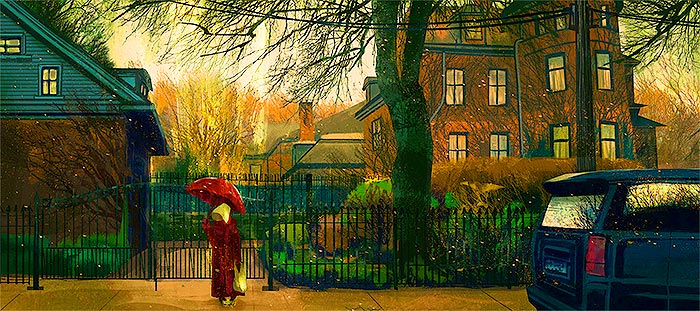
The unfortunate re-assertion of capitalism that was maintained after the banking crisis and the election of far-right political figures makes this unlikely in the here and now. However, the pay-outs and political shifts endured have left us skeptical and as the dust clears and the rubble of our ignorance scatters the ground, our curiosity continues to chip away at the concrete structure that is capitalism and the patriarchy. I don’t know about you, but I would like to see how that reality plays out, even if it be a fictional one for now.
Works Cited
- Encyclopedia Britannica. 2020. Surplus Value | Economics. [online] Available at: <https://www.britannica.com/topic/surplus-value> [Accessed 31 March 2020]. ↩
- Haraway, D., 1991. Haraway_Cyborgmanifesto.Html. [online] Web.archive.org. Available at: <https://web.archive.org/web/20120214194015/http://www.stanford.edu/dept/HPS/Haraway/CyborgManifesto.html> [Accessed 31 March 2020]. ↩
- Rapecrisis.org.uk. 2020. Statistics – Sexual Violence | Rape Crisis England & Wales. [online] Available at: <https://rapecrisis.org.uk/get-informed/about-sexual-violence/statistics-sexual-violence/> [Accessed 31 March 2020]. ↩
- Grinberg, E. and E. Shoichet, C., 2020. Brock Turner Released After 3 Months In Jail. [online] CNN. Available at: <https://edition.cnn.com/2016/09/02/us/brock-turner-release-jail/index.html> [Accessed 5 April 2020] ↩
- Rapecrisis.org.uk. 2020. Statistics – Sexual Violence | Rape Crisis England & Wales. [online] Available at: <https://rapecrisis.org.uk/get-informed/about-sexual-violence/statistics-sexual-violence/> [Accessed 31 March 2020]. ↩
- En.wikipedia.org. 2020. Phyllis Schlafly. [online] Available at: <https://en.wikipedia.org/wiki/Phyllis_Schlafly> [Accessed 31 March 2020]. ↩
- Duh, A., 2020. Ignorance Is Bliss For Melania Trump. [online] Medium. Available at: <https://medium.com/@amandapagee/ignorance-is-bliss-for-melania-trump-a84137764e55> [Accessed 31 March 2020]. ↩
- Karp, P., 2020. Women Will Get Pregnant For Paid Leave, Pauline Hanson Says In Opposing Omnibus Bill. [online] the Guardian. Available at: <https://www.theguardian.com/australia-news/2017/feb/23/women-will-get-pregnant-for-paid-leave-pauline-hanson-says-in-opposing-omnibus-bill> [Accessed 31 March 2020]. ↩
- Merelli, A., 2019. Alabama Governor Kay Ivey Is Just The Latest White Woman To Advance American Misogyny. [online] Quartz. Available at: <https://qz.com/1620691/alabama-abortion-law-kay-ivey-and-the-white-women-for-trump/> [Accessed 31 March 2020]. ↩
- Alter, A., 2017. Uneasy About The Future, Readers Turn To Dystopian Classics. [online] Nytimes.com. Available at: <https://www.nytimes.com/2017/01/27/business/media/dystopian-classics-1984-animal-farm-the-handmaids-tale.html> [Accessed 31 March 2020]. ↩
- Bindel, J., 2016. Outsourcing Pregnancy: A Visit To India’s Surrogacy Clinics | Julie Bindel. [online] The Guardian. Available at: <https://www.theguardian.com/global-development/2016/apr/01/outsourcing-pregnancy-india-surrogacy-clinics-julie-bindel> [Accessed 31 March 2020]. ↩
- Krakouer, J., 2019. The Stolen Generations Never Ended – They Just Morphed Into Child Protection | Jacynta Krakouer. [online] The Guardian. Available at: <https://www.theguardian.com/commentisfree/2019/oct/17/the-stolen-generations-never-ended-they-just-morphed-into-child-protection> [Accessed 31 March 2020]. ↩
- Gupta, A., 2017. The Impact Of Austerity On Children’S Social Care And Practice | ATD Fourth World UK. [online] Atd-uk.org. Available at: <https://atd-uk.org/2017/02/01/the-impact-of-austerity-on-childrens-social-care-and-practice/> [Accessed 31 March 2020]. ↩
- Veronica Stracqualursi, V., 2019. 25 Men Voted To Advance Most Restrictive Abortion Ban In The Country. The Female Governor Signed It.. [online] CNN. Available at: <https://edition.cnn.com/2019/05/15/politics/alabama-abortion-ban-bill-who-voted/index.html> [Accessed 31 March 2020]. ↩
- Mackinnon, A., 2016. What Actually Happens When A Country Bans Abortion. [online] Foreign Policy. Available at: <https://foreignpolicy.com/2019/05/16/what-actually-happens-when-a-country-bans-abortion-romania-alabama/> [Accessed 31 March 2020]. ↩
- Fraser, N., 2013. How Feminism Became Capitalism’s Handmaiden – And How To Reclaim It | Nancy Fraser. [online] the Guardian. Available at: <https://www.theguardian.com/commentisfree/2013/oct/14/feminism-capitalist-handmaiden-neoliberal> [Accessed 31 March 2020]. ↩
- Reproductiverights.org. 2020. The World’s Abortion Laws | Center For Reproductive Rights. [online] Available at: <https://reproductiverights.org/worldabortionlaws> [Accessed 5 April 2020]. ↩
- Moghtadar, M., 2014. Iranian Parliament Bans Vasectomies In Bid To Boost Birth Rate. [online] Reuters. Available at: <https://www.reuters.com/article/us-iran-population/iranian-parliament-bans-vasectomies-in-bid-to-boost-birth-rate-idUSKBN0GB15Z20140811> [Accessed 31 March 2020]. ↩
- Newman, Janet (2013). Spaces of power: feminism, neoliberalism and gendered labor. Social Politics, 20(2)
pp. 200–221. ↩ - Nelson, M., 2019. Microfinance Lenders In Sierra Leone Accused Of ‘Payday Loan’ Interest Rates. [online] the Guardian. Available at: <https://www.theguardian.com/global-development/2019/dec/12/microfinance-lenders-in-sierra-leone-accused-of-payday-loan-interest-rates> [Accessed 31 March 2020]. ↩
- Davies, W., 2018. Economic Science Fictions. 1st ed. London: Goldsmiths, p.95. ↩
- Smith, S., 2015. When We Blame Tech For Everything, Capitalism Gets Off The Hook | SE Smith. [online] the Guardian. Available at: <https://www.theguardian.com/commentisfree/2015/jul/06/blame-technology-capitalism-smartphones> [Accessed 31 March 2020]. ↩
- Column, S., 2019. Organ Trafficking: ‘They Locked Me In And Took My Kidney’ – The Mail & Guardian. [online] The Mail & Guardian. Available at: <https://mg.co.za/article/2019-02-19-00-egypt-europe-migration-smugglers-organ-trafficking-clampdown-refugees-selling-kidney/> [Accessed 31 March 2020]. ↩
- Brown, L., 2013. Crisis-Burdened Spain And Cyprus Are Hot Spots For Women To Sell Their Eggs. [online] Quartz. Available at: <https://qz.com/83547/crisis-burdened-spain-and-cyprus-are-hot-spots-for-women-to-sell-their-eggs/> [Accessed 31 March 2020]. ↩
- McElvany, K., 2014. Agbogbloshie: The World’s Largest E-Waste Dump – In Pictures. [online] the Guardian. Available at: <https://www.theguardian.com/environment/gallery/2014/feb/27/agbogbloshie-worlds-largest-e-waste-dump-in-pictures> [Accessed 31 March 2020]. ↩
- Bowles, P., 2007. Capitalism. 2nd ed. Harlow, England: Pearson/Longman. ↩
- En.wikipedia.org. 2020. Me Too Movement. [online] Available at: <https://en.wikipedia.org/wiki/Me_Too_movement> [Accessed 31 March 2020]. ↩
What do you think? Leave a comment.











A very forward thinking teacher in my school sixth form suggested this for us to study and I have been a huge Atwood fan ever since.
I reread “The Handmaid’s Tale” every so often and I am never disappointed. It is at once bleak and full of hope; scabrously witty and deadly serious, full of praise for the human spirit and damining of human nature.
A wonderful, wonderful book from one of the world’s greatest authors.
One of my favourite teachers in high school introduced me to this book and I love it as much now as I did then. I’ve since read lots of Atwood’s other books and enjoyed them but none have stuck with me the way The Handmaid’s Tale did. It’s an extraordinary book and absolutely deserves its place among classics like 1984.
I know a lot of people who either don’t read or say they don’t like “serious books”. These are the people who I tell to read The Handmaid’s Tale.
I really should give it another go. I regret to say that I really struggled with it on reading it some 25 years ago.
As Stephen Colbert once said: “Margaret Atwood is writing a sequel to The Handmaid’s Tale, and Donald Trump is almost finished with the prequel.”
Its very true. He has become so powerful and dangerous. His relentless repealing of human rights acts and access to healthcare has taken the country back by years. He falls for everything and stands for nothing that benefits the population apart from the small few who do not need it. Obama may have had his flaws like all presidents but generally things change for the better moving forward. I don’t think anyone can say the same for Trump he is one of our present day dystopias in leadership.
Why are all the protesters carrying giant green underpants in that picture?
“We chose the green bandana as an emblem because bandanas are already linked to social activism in Argentina, being the symbol of the Mothers and Grandmothers of Plaza de Mayo [who fought for their disappeared relatives during the 1970s dictatorship].” https://www.bbc.com/news/world-45110492
Margaret Atwood scares the hell out of me. And please don’t think The Handmaid’s Tale is her best and/or only book. Dig into Alias Grace. For my money it’s her best work.
She’s terrifying–in perhaps the best way. Because we know if we aren’t careful, the world she creates could become the real one.
The negative reactions to THT book/show always interest me.
Atwood was inspired by the religious fundamentalism on the rise in Iran in the 80s but also to connect that with the oppression of women throughout the world and across history, a key point being that there was a connection in the ideological underpinnings of the attempts to control and oppress women, whether that was full subjugation or legislative and social control of their bodies.
So it is difficult to read the book (or watch the show) and not be aware of the links it makes with the very real oppression taking place elsewhere or to see it as primarily an attack on western or Christian cultures.
However, at a time when the right to abortion in the US is under threat, in which there are successful legal steps to severely limit the ability to access abortion and for reproductive freedom, in a culture in which we’ve seen the rise of the incels and the notion of “enforced monogamy”, and the fact that women are more likely to be murdered by a man they know or were in a relationship with, it is also really difficult to look at all that and say there can be no connection drawn between the oppression of women elsewhere or, that in the right (or wrong) circumstances, that it could not happen here or that we’re above that that ideological misogyny.
When The Handmaid’s Tale was first released, it was the only book I ever read in one night. Even though I had to be at my desk at 8:30am, it was so gripping I couldn’t put it down.
All empire’s fall and I am convinced that today we are watching the fall of the American Empire and (if Pence becomes president) the potential rise of New Gilead.
It only takes a few old men to silence women and deny their rights to justice. Under their eyes…
So true and such a shame that the first thing government go for in these terrible times are the repealing of human rights. How can a government say women have equal rights when they don’t have ownership over their own bodies and family planning. Its beyond me.
I am currently reading The Year of the Flood. What it would have seem science fiction a decade ago, it is disturbingly normal today. The vegetarians as a religious cult is quite accurate. All of the characters of the book are very well equipped with relevant set of traits that makes the social group to which they belong all the more real. But I often skip paragraphs as I find some long passages redundant or disjointed from the main narrative.
Instead Kazuo Ishiguro’s book take you hostage from page one to the end without giving you the chance to breath. I had to distance myself from The Unconsoled as the confusion of the main character were becoming my nightmares. Between Atwood and Kazuo Ishiguro, I think the Nobel price went to the right person- by far.
I like both but I think Attwood is a more skillful writer by some distance.
In the Handmaid’s Tale you have a reasonably good Idea of the philosophy of the tyranny and how some of the milestones on the road from a democratic US in the late 20th century to Gilead not long after were passed. She achieves that without resorting to lengthy, linear exposition.
In Never Let Me Go, a beautiful, heartbreaking novel in my opinion, we get a dystopian near future. How it arrived, who controls it and for the benefit of whom we never find out.
Yes, that is quite right. The difference is where they put their focus. The skilful description of personal relationships and the nuanced detail of emotions in their complexity, is in my view mastered by Ishiguro. A Pale view of the Hills or The Buried Giant are beautiful explorations of love and terrible sorrow by mother and daughter or an elderly couple. That does it for me.
Never Let me go was a half backed novel for Ishiguro’s standard, in my humble view 🙂
I’m forever grateful to Margaret Atwood, as I was once stuck for three days in a motel in very snowy Belgium when my car broke down. The TV in my room didn’t work, and I was reluctant to spend any money, as I was worried about the cost of the car. I’d grabbed a few things from the car, including a Christmas present of The Robber Bride. The book was my only form of entertainment. It’s the only time I’ve ever finished a book and immediately started again, so thank goodness it was such a brilliantly written work.
Atwood is a good writer, but her blinkered point of view detracts from her power as a cultural force. She has argued that women will suffer more than men because of climate change and that women suffer more than men from the effects of war.
I would add that this way of thinking has led many women to believe that setbacks they suffer in life are because they are women. Sadly for us all, setbacks and suffering are part of life and affect men as much as women. In fact, it could fairly safely be argued that in quite a number of rather important areas of life such as – life expectancy, health spending, suicide, pension age, compulsory military service (in some countries), harsher punishments for the same crimes, prison numbers, homelessness, drug and alcohol abuse, underperformance in education, occupational deaths and over-representation in risky and physically taxing occupations such as front-line military duty, firefighting, mining and construction – men are in fact considerably worse off than women.
Absurd reasoning. The disadvantages that men may suffer compared to women have been brought upon themselves by the millennials long patriarchal culture, laws made exclusively by males – until recently-, and positions of power, low and high, public or private, hold exclusively by men -until recently-. A clear example is the mandatory draft. Male authorities and male legislators in their time decided to impose it on their peers, and decided to exclude females from it. They could as well have rejected the measure or included females.
The disadvantages listed on your comment besides are not gender related, women in the same positions that men will suffer them as well, for example, occupational hazards.
Now the disadvantages that women suffer are a consequence of the patriarchal culture and the rule of males. Although in developed countries many women are able now to fulfill their potential thanks to the changes pushed, amongst other, by the vilified feminists -women and men- since the late nineteenth century, the sad reality is that at a global scale the vast majority of the women will experience less opportunities or will be denied access to: personal freedom, education, jobs, markets and financial independence. All this imposed on them EXCLUSIVELY because of their gender, and enforced by the male ruling society where they live in.
The GII or gender inequality index reflects this reality, and according to it, not one single country has achieved total equality. The USA doesn’t even rank among the 10 tops. So there’s still a lot of work to do.
I am in agreement here. When decisions are made by men for the whole and have enforced gender roles on society since forever, there is only one ruling force and that is the patriarchy. Men do have it bad at times, you’re right. However, it is men making those decisions for other men.
Women also have occupational hazards. Especially those in the sex industry, which is frequented by a prominent male cast. Women are left without rights, access to healthcare, safety or the benefits of what a “normal” job might have. Its hypocrisy. Nurses and care workers also have hazardous jobs where they are beaten and abused and if you look at the way rape is used as a weapon of war and how women are abused in the military its enough to put anyone off applying. Not that women haven’t. In fact they have petitioned to be on the front line. As have many female journalists and foreign correspondents.
Nah, women really do have the deck stacked against them. I am no feminist, but I see this every day.
One only has to look at the politic and religious radicalism of Poland and Hungary, where religion is a tool of the far right in power to understand just a slight step further to the right could create a Handmaid’s tale there… wherever religion and the extreme conservative state are hand in hand abuse of the individual’s freedom is always in chronic danger…
My father always said never take freedom for granted for what you have today can be taken away by stealth or force and it is always harder to climb out of a hole than be pushed into it. Stories like this help to keep us aware.
I am surprised to hear that ‘The Handmaid’s Tale’ has been banned in some schools. I first encountered the book at school, as an A-level set text, and wrote a comparison of the epilogue with that of 1984 for my A’level English Literature coursework.
Thank you for covering a book or other work of art which is timeless is ever and always about the here and now.
The Handmaid’s Tale captivated and chilled me when I first read it (it must have been in about 1989). The parallels to the radicalisation of global politics are chilling me now. Who’d have thought that 30 years on we’d be looking at The Handmaid’s Tale as a harbinger of the way parts of the world could go if some of today’s political leaders have their way?
THT great read. it’s up there with Animal Farm as one of those books I am glad to have read, but found so powerfully resonant that I can’t bear to reread.
Thanks for the article Lousands – a fascinating read.
The Handmaid’s Tale gave me nightmares (literally) – the only other book that has done that is 1984.
One of the (many) reasons it works so well is that Margaret Atwood places the story in a time when, although the dysfunctional society is well established, the protagonists can still remember what the old world was like. So often dystopian worlds are set in some far off future, where all that remains of the previous society are folk memories and rumours.
‘It’s strange to remember how we used to think, as if everything was available to us…’. Absolutely chilling.
My daughter had “Nolite te bastardes carborundorum” tattooed across the top of her back when she was about eighteen. I was not consulted, which pleases me. It’s quite visible when she wears her hair up. She always tells the inquisitive, “It’s from The Handmaid’s Tale by Margaret Atwood. Have you read it?” I wonder how many copies she’s responsible for selling.
I read The Handmaid’s Tale in October 2001, as a teenager in the US. It scared me enough that I haven’t been able to read it again, even though I liked it. The parallels to what were going on then were so close that I really wondered if it wasn’t going to “come true”. Twenty years later, I’m still worried, moreso now.
A great, powerful book. And I still expect the US to turn out like Gilead at some point in the future.
Gilead, or worse.
The Handmaid’s Tale was the first book I read where I realised literature could do more than just tell tales. It’s a deserving classic and should never be absent from a school library.
As a woman in a third world country, The Handmaid’s Tale found a strong resonance with me. It is a bloody brilliant book – right there with Orwell’s 1984.
I try not to draw parallels with fiction and reality, but the sad fact is that a version of this is possible. Improbable, but still possible.
I doubly try not to draw parallels with the Trump universe, as it seems too lazy, too easy to do so. Then I see crowds baying over his lies and realise that a great many of his followers choose to believe him. They don’t want to think rationally, the content of his speeches don’t really matter. It’s an ‘us or them’ situation for them. Truth is irrelevant. They’re on the right side of history.
Then it falls into place. How easily a version of ‘Gilead’ could exist.
When I first started watching Handmaid, I wondered what had happened to the non-white people in Gilead. I figured they’d presumably brought back slavery… which could have made for some rather disturbing / powerful TV. I suppose there are a variety of reasons why the story didn’t go in that direction, not least because as the article says Margaret Atwood’s novel doesn’t go there either.
As the show went on I must admit the diverse casting did start to bug me; not because I don’t like to see diverse casting of course, but because it felt like the show didn’t have the courage to place this diversity into the actual narrative. It didn’t seem to make sense, given how horrible everything else about Gilead was. Basically, what this article just said.
But in retrospect it perhaps makes sense when you consider that Gilead is all about the bible. For all its faults, the bible does not advocate racism. Sure, Christian folks in later years would try and justify racist actions in a religious context, but that comes from an interpretation of Christian doctrine rather than the bible itself. There is stuff about slavery in the bible, but I don’t think any of it is based on race. Probably someone can dig up a comment from the OT to prove me wrong (Old Testament; not Original Trilogy).
So in terms of the story, I think one can justify the fact that Gilead is misogynistic.
It’s beyond me why “Handmaid’s Tale” became a best seller. Very plodding book. I gave up reading it well before the half way mark.
That is not something to brag about, mate
Well, not every writing style is for everyone. Did you like the series better? Sometimes I find that if the book is plodding, the series/movie makes it a lot easier to appreciate it. Sometimes I’ll watch a visual version and then try the book again.
A feminist hero and a legend in her own lifetime. Margaret Atwood, your work has made a difference, and has awoken millions. There is no greater legacy of an artist than to make relevant assessments of their time and to contribute to the spirit of enlightenment.
The haters want to diminish your work because of what it represents, but “Nolite te bastardes carborundorum”. 🙂
I think there’s a real parallel between the Handmaid’s Tale and the modern surrogacy industry. Both seem to be operating under the assumption that people have the right to use a woman as a vessel for creating a baby. One key difference, I suppose, is that in real life surrogates get paid (usually), but it’s hard for me to imagine anyone going through something like that unless they needed the money badly.
Margaret Atwood writes fantastic stories, with great literary skill, with depth and meaning, that are so easy to read. Can’t ask for more from fiction.
Exactly right – she is almost certainly our best living author.
Thank you Canada for sharing Margaret Atwood with the rest of the world….my heat skips a beat whenever I read an article about her and watch the Handmaid… praise be1
There is only one us-vs-them, which is the rich and their treasonous political lackeys vs. the rest of us. Widespread manifestations of racism, sexism, and nationalism all stem from disenfranchisement of millions of people because there is an ongoing wealth transfer (read: theft) of trillions of dollars into the holdings of the most wealthy people in the history of humankind by traitorous politicians that is paid off by cutting essential social services, pensions, safety nets, education and all other basic socioeconomic necessities that are necessary for any inclusive, progressive country.
Thanks for writing a great, empowering article.
Nothing against Atwood, but I’m done with the dystopian genre. I don’t need more doom and gloom in my life.
Sometimes these warnings in books help right minded people to fix things. I think our current crop of angry right wing men won’t do anything.
She does write straight forward modern fiction as well, especially in her early writings.
IMHO they’re not as well developed as her dystopian stuff (to me they read like short stories padded out to novel length), but they’re good one-off, casual reads.
I was fortunate to have ‘ The Handmaid’s Tale ‘ 1st edition which I gave to my grandchildrens mother.
While recently a prisoner in California State prisons, no other narrative came to mind as much as The Handmaid’s Tale. The imagery, the haunting implications of fighting to survive within a coercive encironment – all of this in The Handmaids Tale came back to me as a prisoner. I distinctly recall, for example, seeing – quite literally – thousands of my fellow women prisoners lined up in concentric lines, all in bright orange jumpsuits, all staring ahead, all with our hands duitfully clasped behind our backs – waiting to go into chow hall. I thought at that moment of The Handmaids Tale, and tears sprang to my eyes. Later that same night, I scratched “Nolite te bastardes carborundorum” in my cell where I could see it throughout the many, many days ahead.
Prior to prison, when I first read this harrowing book, I never dreamed the resonance it would later have on me, nor that I would subsequently live an experience that markedly echoed the narrative in the book.
Made the hair prick on the back of my neck. I have read some awful experiences of both women and men in prison and the lack of humanity and rehabilitation. It seems there are no second first impressions and people are treated like animals. No wonder people reoffend and are haunted by the fight for survival in a place where its second nature to disregard another human being. 🙁
There seems to be a genre of female Canadian writers , Margaret Attwood , Margaret Lawrence , Alice Munroe and a few more.
I am with exitement starting into my first Atwood novel, Year of the Flood, at my here/now 58th year OML (of my life). and i must say Wowzers! so far so good!!
There is nothing new about the treatment of women in The Handmaids Tale. Throughout history women have been treated like this, and they still are in some countries/cultures.
Nothing new under the sun, indeed. It’s too bad there aren’t more books like The Handmaid’s Tale. People don’t like to hear the things these books have to say…but we need to, so much.
Atwood wrote a powerful book set in a patriarchal society ruled by an ancient ‘holy’ book. Hmm, where could that be, now.
MA has said that she was inspired to write the book in the 1980s by the then-recent Iranian revolution, asking “what if that were to happen in North America?”
Extremely powerful argument and article. I found it to informational as well as emotional. The photography used also holds depth and weight empowering the article to a higher degree, wonderful job!
As a society, we place a lot of significance on reproduction. Because women tend to control the process more easily than men, the only way men can take back the power is through religious and cultural persuasion, and at times coercive measures. Under the strong cultural current, women voluntarily stripe their identities once they become mothers. I hope one day women use the pictures of their parents, siblings, friends and partners as often those of their children as their Facebook profile pictures.
Thank you for all of your comments. They are very much appreciated and food for thought in my ongoing research 😀
A good essay. Good insight relating movies to current issues.
The Handmaid’s Tale is such a powerful piece of literature. I first read it in my grade 12 English class and remember feeling so horrified, especially since everything in the novel has occurred in real world events at some point or another. But I think that it is important to feel that horror, otherwise the hope that comes later in the book can be overlooked. This was a very thought provoking essay.
I love Atwood’s novels and this article does a great job of explaining how her work (and art in general) is practically relevant to the world today.
I just started watching The Handmaid’s Tale, so wanted to read this before getting into it too far. How you related it to actual circumstances women confront is done well.
As a huge fan of Atwood’s works, I am so happy to see an article like this. Your many valid points, the statistics used, and the comparison of victim blaming culture in The Handmaid’s Tale to current world events are quite inspired. Thank you for sharing this with us!
I think your comparison between the practice of reproductive slavery in Gilead and Indian surrogacy hostels is a very important one to make. Although the surrogate mothers in the latter case arguably have more choice over their bodies, this choice is made in the face of huge power imbalances. The fact that women must rent out their wombs to support themselves/their families for the goal of providing children to wealthier individuals (who are often foreigners) is a twisted, capitalistic vision of The Handmaid’s tale.
Highly interesting article. There’s something haunting, and telling, about the image of women in the 21st century in red robes and white caps. We have come a long way, but still have a long way to go…
Interesting reference to Phyllis Schlafly (Missouri). I did not know she was used, I guess as a model. One writer said of Schlafly, “An influential life is not always a good one, however, and Schlafly’s was especially pernicious.” (https://time.com/4482171/phyllis-schlafly-donald-trump/)
This was an interesting read. I was wondering if you read the sequel to The Handmaid’s Tale and if you thought any differently about it. I know that things aren’t much better in Gilead 20 or so years after Offred’s time, but I also found it to be a much more hopeful of a conclusion compared to how The Handmaid’s Tale was. That might have partially been because the book was written so far apart from the first book, but I also thought that The Testaments was also for a whole other set of audiences. Your article made me ponder on this for some reason. I would love to hear what you think.